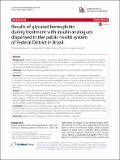Use este identificador para citar ou linkar para este item:
https://repositorio.fepecs.edu.br:8443/handle/prefix/128| Tipo: | Artigo de Periódico |
| Título: | Results of glycated hemoglobin during treatment with insulin analogues dispensed in the public health system of Federal District in Brazil |
| Autor(es): | Leite, Eliziane Brandão Pedrosa, Hermelinda Cordeiro Casulari, Luiz Augusto |
| Abstract: | Background: Diabetes treatment requires specialized multi-professional teams, supplies for blood glucose monitoring and training for self-injections of human insulin or insulin analogues. The State Health Secretariat of the Federal District (SHS-FD) has dispensed insulin analogues by means of clinical validated protocols since 2004. However, data on outcomes of follow-up are still unknown. Objective: To evaluate the results of glycated hemoglobin (HbA1c) among diabetic patients treated with insulin analogues. Methods: It is a retrospective cohort study involving data of type 1(DM1) and type 2 diabetes (DM2) patients 18 years old and above who were registered to participate at the insulin analogues dispense program of the SHS-FD. Evaluation of criteria of insulin treatment continuity was based on HbA1c values achieved in the follow-up period: in the target, <7 %, patients between 18 and 65 years old; <8 % for those above 65 years old; out of target, when values were superior these cut off points for both age groups; and minimum 0.5 % reduction of two HbA1c values during follow-up. Results: Two hundred and fifteen formularies were analyzed: Type 2 patients (63.7 %) and female sex were the most prevalent (63.7 %), (p < 0.05). Mean age and SD were 41.5 ± 23.5 years among DM1 and 60.5 ± 28.5 in those with DM2. HbA1c in the target was found in 26 %, 48 % were out of target and 26 % achieved 0.5 % minimum reduction in HbA1c value (p < 0.05). The main clinical characteristics associated with HbA1c found to be in the target were older age (>65 years), more than three medical appointments in the follow-up and lower mean HbA1c in the patient selection for inclusion criteria in the dispense program (p < 0.05). Conclusion: The low number of patients using insulin analogues in the target group, considered to be in good control, implies the need to reevaluate both level of patients self-care knowledge and glucose monitoring prior their inclusion in the insulin analogue dispense program. Reinforcement and training of health professional teams in enrollment procedures should be on mandatory basis to avoid protocol failure or deviations. |
| Palavras-chave: | Diabetes Glycated hemoglobin Insulin analogues Glargine Treatment Análogo da insulina Hemoglobina glicada Tratamento |
| CNPq: | CNPQ::CIENCIAS DA SAUDE::MEDICINA::CLINICA MEDICA::ENDOCRINOLOGIA |
| Citação: | LEITE, Eliziane Brandão; PEDROSA, Hermelinda Cordeiro; CASULARI, Luiz Augusto. Results of glycated hemoglobin during treatment with insulin analogues dispensed in the public health system of Federal District in Brazil. Diabetol Metab Syndr, v.7, n.66, 2015. DOI 10.1186/s13098-015-0061-0 Disponível em: ttps://www.ncbi.nlm.nih.gov/pmc/articles/PMC4539715/pdf/13098_2015_Article_61.pdf. Acesso em: 12 maio 2020. |
| Tipo de Acesso: | Acesso Aberto |
| URI: | https://repositorio.fepecs.edu.br:8443/handle/prefix/128 |
| Data do documento: | 18-Jul-2015 |
| Aparece nas coleções: | Artigos publicados em periódicos - MP |
Arquivos associados a este item:
| Arquivo | Descrição | Tamanho | Formato | |
|---|---|---|---|---|
| 13098_2015_Article_61.pdf | ARTIGO_resultsofglycatedhemoglobinduringtreatment | 951,81 kB | Adobe PDF |  Visualizar/Abrir |
Os itens no repositório estão protegidos por copyright, com todos os direitos reservados, salvo quando é indicado o contrário.

